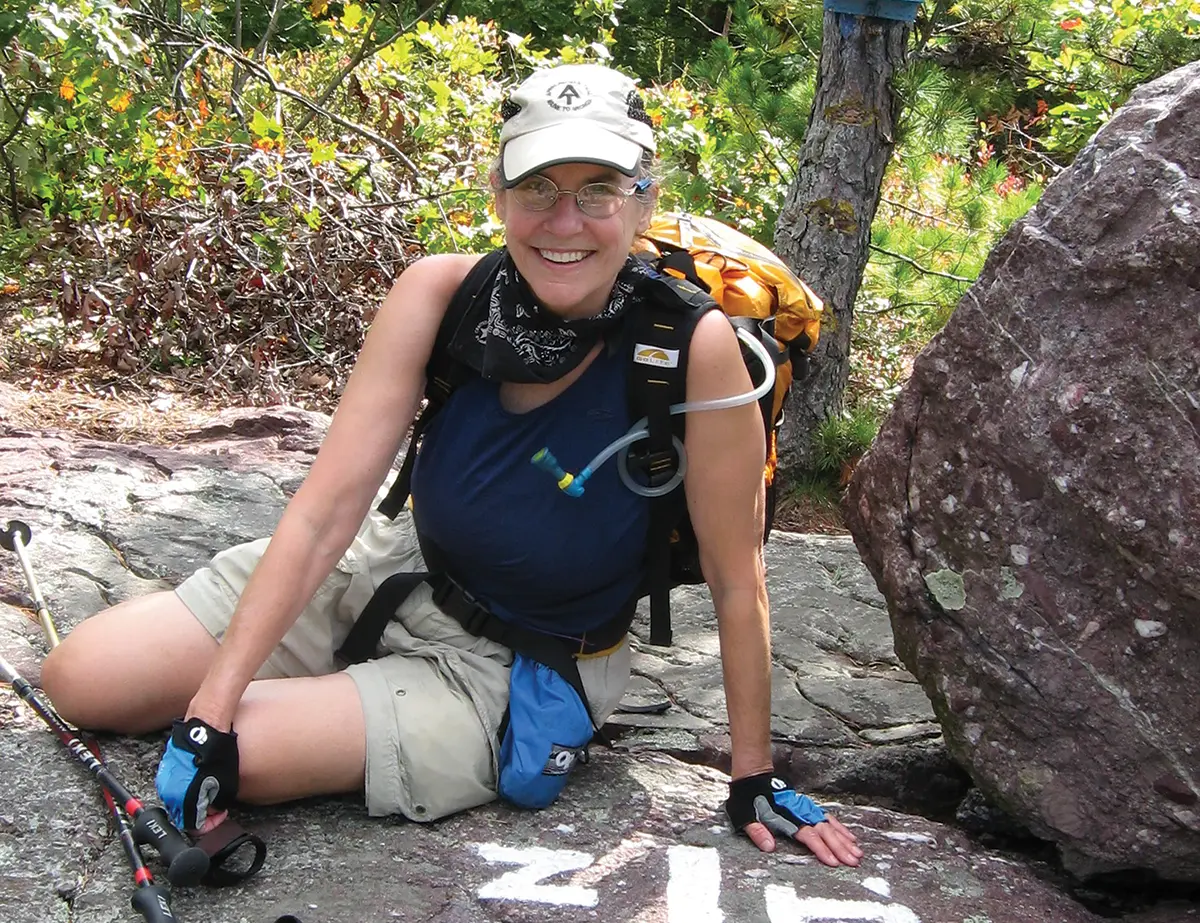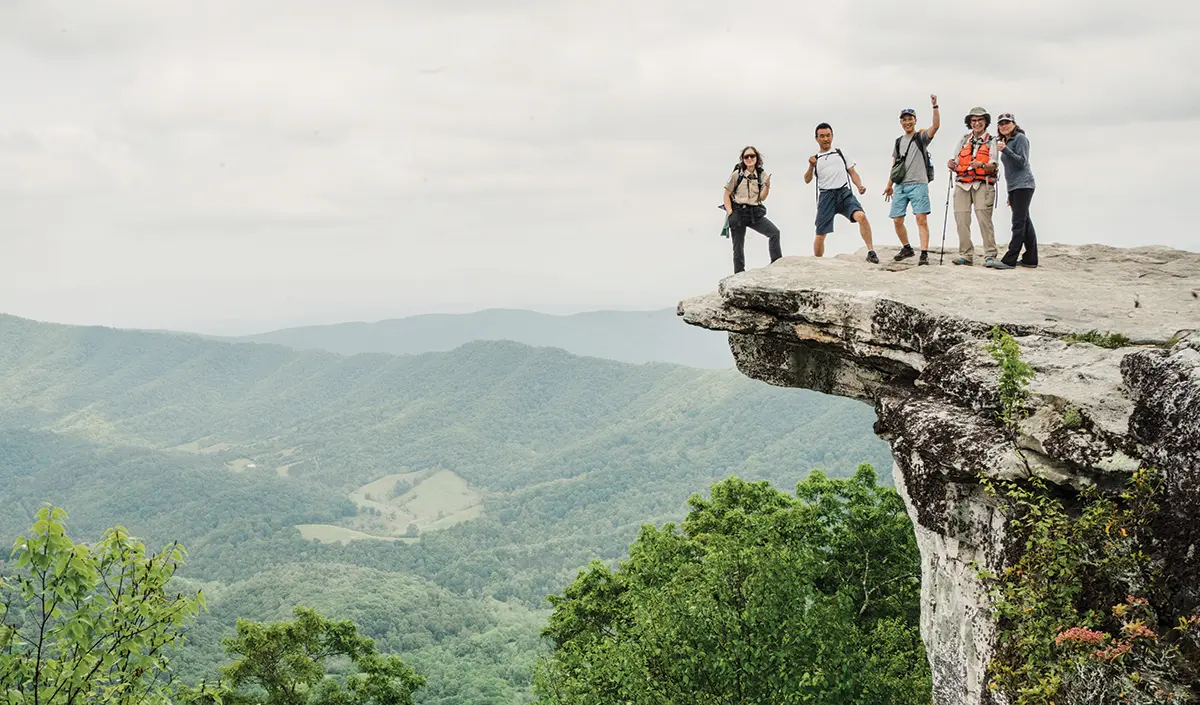spotlight

A 2,200-Mile-Long House in the Woods
After some frustrating attempts, in 2003, they found Salem, Virginia. Salem was, as Christopulos calls it, “the Goldilocks spot” that met all their criteria. (It even had a minor league team — now the Salem Red Sox, which is affiliated with the Boston Red Sox.)
As an experienced hiker, Christopulos knew that the A.T. ran near Roanoke. Before she was fully settled in her new home, she was hiking the Trail with the Roanoke Appalachian Trail Club.
Before closing her business and moving to Virginia, Christopulos traveled east to complete a few 100-mile A.T. sections. She then expanded her miles as her free time increased. “I started off hiking a week in the spring, a week in the fall, then I did two and two, then four and six weeks at a time,” she says.
Her first Maine A.T. hike was harder than she imagined, so Christopulos developed a strategy to tackle the Trail. She’d start in Maine and hike the hard trails through the New England states first. “I was in my fifties at the time. I thought ‘I don’t want to be hiking New England when I am older,’” says Christopulos, now 76.
Her new home in Virginia gave her easier access to southern parts of the Trail. In 2008, eight years after she began, Christopulos completed the A.T. She hiked ten weeks in that last year, covering the south in the spring and the north in the fall. Her parents, sister, and some people Christopulos had hiked with joined her to hike the last half mile at her beloved Harper’s Ferry, where her self-described “A.T. obsession” began.

This commitment to ensuring that the A.T. experience endures for future generations inspired Christopulos to become a dedicated and generous financial supporter of the ATC’s mission. Wanting to have the greatest impact possible, she has savvily leveraged her lifelong savings to make contributions directly from her IRA by way of Qualified Charitable Distributions (QCD). A win-win, she helps the Trail and also lowers her tax burden.
In most cases, the withdrawals from an IRA are considered taxable income. However, retirees can direct the distribution to a nonprofit organization like the ATC. If the distribution is sent directly to the charitable organization, the distribution is not taxable as income since the retiree never received money.
She has also made the ATC part of her estate plan. “Organizations like the ATC need financial continuity,” she says. “Giving vehicles like the QCD and estate planning allow organizations to plan for the future.”
Because of what the Appalachian Trail means to Christopulos, she’s always thinking of a new or improved way to keep the hiking experience beautiful and meaningful for others, now and into the future. “The Trail feels like a second home for me,” she says. “It’s like having a house in the woods, just that it’s a 2,200-mile-long house.”

Christopulos served on the club’s board for eight years, including as vice president and president. She’s been a passionate leader, involved in projects that protect the health and future of the Trail. Currently, she is the RATC’s archivist, preserving the club’s history since its 1932 founding. She says — with a laugh — that the role is a good match for her doctorate in history.
The popularity of McAfee Knob means protecting both the Trail and hikers. Christopulos has been part of a five-year visitor use management project with the National Park Service to balance the recreational experience with protection of natural resources. When the Virginia Department of Transportation received funding to build a pedestrian bridge over a highway at the McAfee Knob trailhead in 2017, she served on the project’s multi-agency task force, with bridge completion slated for late 2024.
Christopulos acknowledges that volunteering takes a lot of time, which most working people don’t have. “The vast majority of RATC volunteers are over fifty, and a lot are over sixty, so we need to continue to reimagine ourselves as a member organization.” She believes strongly that the future of the A.T. means diversifying the volunteer corps.
In 2019, Christopulos was named the national winner of the Cox Conserves Heroes Award sponsored by Cox Enterprises and the Trust for Public Land. The program honors environmental volunteers dedicated to their local communities and donates to the winner’s preferred environmental nonprofit. Christopulos directed the $50,000 to the ATC. This was in addition to a $10,000 ATC donation she was previously awarded for being the state-level Hero for Virginia.
“I’m happy to do whatever is needed to protect the Trail and its surroundings to make it possible for others to enjoy it — whether that’s working with state and national agencies or hauling debris off the Trail.”